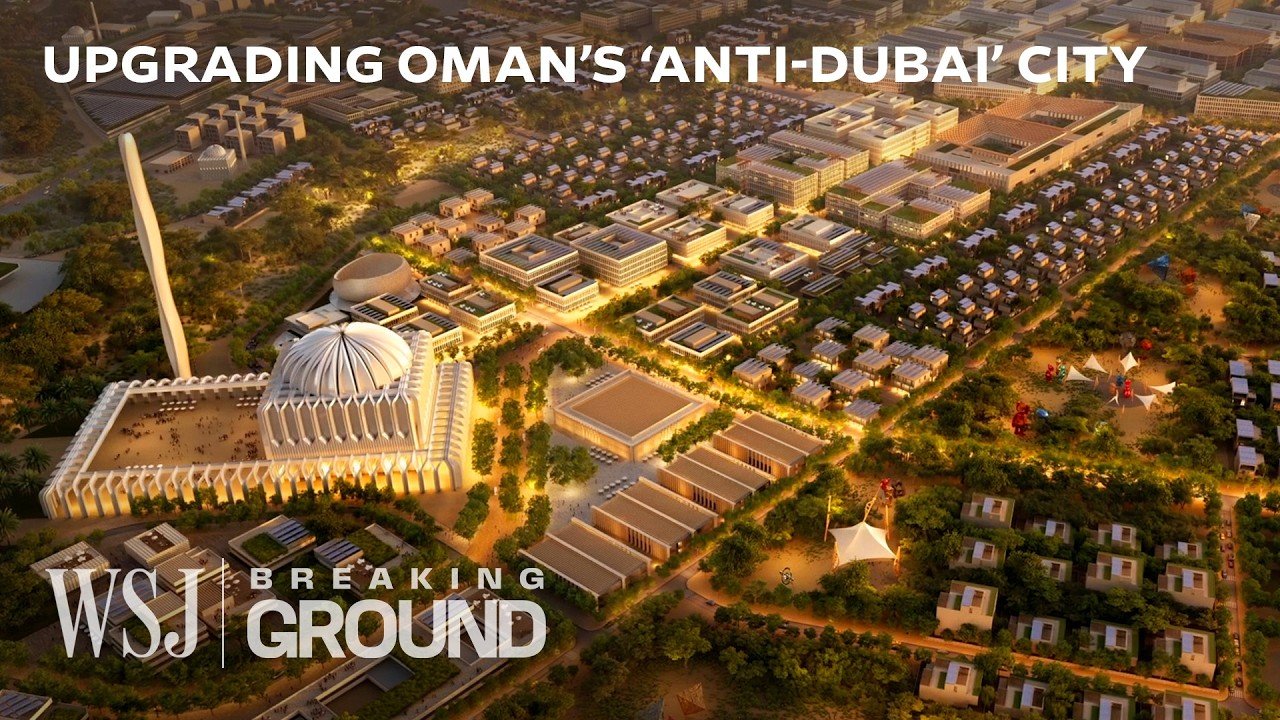Muscat, Oman, sometimes described as the anti-Dubai, is trying to modernize as it looks toward an economic future without oil. But can it create a new model of a Middle Eastern city or will it succumb to the glitzier approach of its neighbors like the Line in Saudi Arabia or Egypt’s new capital?
WSJ explores the new project aimed at modernizing Muscat and explains why it’s important to the country.
Chapters:
0:00 Muscat
0:51 The project and why it’s important
2:30 Dysfunctional housing policy
4:21 Tourism and international investment
6:40 What’s next?
Breaking Ground
Breaking Ground digs into megaprojects around the world, uncovering what these developments might mean for the surrounding region and the ultimate costs.
Why China is building its first megaport in Peru:
#Oman #Megaprojects #WSJ
source

Why China is building its first megaport in Peru: https://on.wsj.com/3Tb0WTD
Remember Oman gave UAE the land.
We were right all along just had to rearrange the details
Neom has hit many bumpers already…….it's nuts !!! unless you got a good pay check then you keep quiet till they stop paying……soon!!
Absolutely delighted to see the sensible development of Oman continues.
Oman is a beautiful country, the Omani people are true Arabs, friendly and hospitable.
I enjoyed 3 years with S O A F and saw a lot of a beautiful country, would love to return and see it now, but too old !
Long may Oman prosper. !
A walkable city? Thats revolutionary!
Incredible wastes of money
What is wrong with despotic governments that answer to no one.
Come on man..mental fragmentation isn’t working anymore. Give me something new…I expected better strategies from you…so disappointed
It looks like Hagastaden project in Stockholm sweden
The best model of development Horizontal City is Singapore
Unabhängig vom Ergebnis, sollten bei solchen Projekten immer auch erwähnt werden dass Massen von billigen Arbeitskräften dabei sterben.
Die Menschenrechtslage im Oman ist ernst zu nehmen und wird seit Jahren von internationalen Organisationen wie Human Rights Watch und Amnesty International kritisiert. Obwohl der Staat nach außen hin als stabil und relativ wohlhabend gilt, herrscht im Innern ein autoritärer Kurs insbesondere gegenüber Menschen, die abweichende Meinungen äußern oder sich gesellschaftlich engagieren.
Wer sich kritisch über die Regierung, den Sultan oder religiöse Themen äußert sei es in Medien, bei Demonstrationen oder auf Social Media riskiert Überwachung, Einschüchterung oder Verhaftung. Solche Festnahmen erfolgen oft ohne Anklage und ohne Zugang zu Anwälten oder Angehörigen. In einigen Fällen spricht man von "Verschwindenlassen", da Betroffene über Wochen oder Monate nicht auffindbar sind.
In Gefängnissen sind Berichte über Isolationshaft, Misshandlungen oder psychischen Druck nicht selten. Das betrifft besonders politische Aktivistinnen und Aktivisten, Menschenrechtsverteidiger oder Blogger, die zu Themen wie Arbeitslosigkeit, Korruption oder Umweltproblemen öffentlich Stellung nehmen.
Proteste im Land etwa wegen steigender Lebenshaltungskosten oder Arbeitslosigkeit – wurden in der Vergangenheit mit Polizei- und Militärgewalt niedergeschlagen. Die Justiz im Oman gilt als nicht unabhängig, vor allem bei Fällen mit politischer oder gesellschaftlicher Relevanz.
Trotz internationaler Kritik verbessert sich die Lage nur schleppend. Die Regierung betont zwar Reformwillen und gesellschaftliche Öffnung, doch die Realität bleibt geprägt von Kontrolle, Angst vor Repression und dem Schweigen vieler Betroffener.
Oman is by far my favourite country in the region, please stay the way you are.
This was so cringe inducing it was hard to watch.
I have actually gone to Oman several times. The first time was on business. Every time after that was on holiday. It's a wonderful place. It is very tolerant of "Westerners" relative to most other Islamic countries.
They do get red tide in summer though, which sucks. Still, we go back there every couple years.
Oman ❤china
Chinas infrastructure projects ❤
the Oman city project (as well as the new capital project in Egypt are well under budgeted.. their costs are $26,000 & ~$10,000 per people.. that's not only building the houses/apartments, it is also building roads, schools, hospitals, fire & police depts, recreation parks, water supply, waste management, power grid,… they are dreams by politicians trying to pocket lucrative deals for themselves. There is a need for growing population and it must be addressed but reality is something doesn't add up
These videos have been solid. Good experts allowed to express introductions to the complex nuances in the situations.
Rooting for you Sultan Haitum City
Nice to see a common sense project in that area, as opposed to the lunacy in Saudi and Dubai, they are far nicer people also.
Best arabian country in the world 🌍
🇴🇲🇴🇲🇴🇲🇴🇲🇴🇲🇴🇲🇴🇲
🇴🇲🇴🇲🇴🇲🇴🇲🇴🇲🇴🇲🇴🇲
🇴🇲🇴🇲🇴🇲🇴🇲🇴🇲🇴🇲🇴🇲
🇴🇲🇴🇲🇴🇲🇴🇲🇴🇲🇴🇲🇴🇲
🇴🇲🇴🇲🇴🇲🇴🇲🇴🇲
🇴🇲🇴🇲🇴🇲🇴🇲🇴🇲🇴🇲🇴🇲🇴🇲
Oman is a great country and Omani are very friendly and good people.
What is the price of 2bhk apartment kindly give me some information thanks
Please refer to immigrants as an immigrant not expats
i hope the benze you produce dosnt end up in are oceans like your neighbours oil . what was your population 200 years ago
They are just copying American urban spread like Chicago’s and nyc’s 🫤
Keep Middle East, Middle East. I love Omani and Yemeni architecture, I hope they keep that style.
banning high rises is incredibly stupid